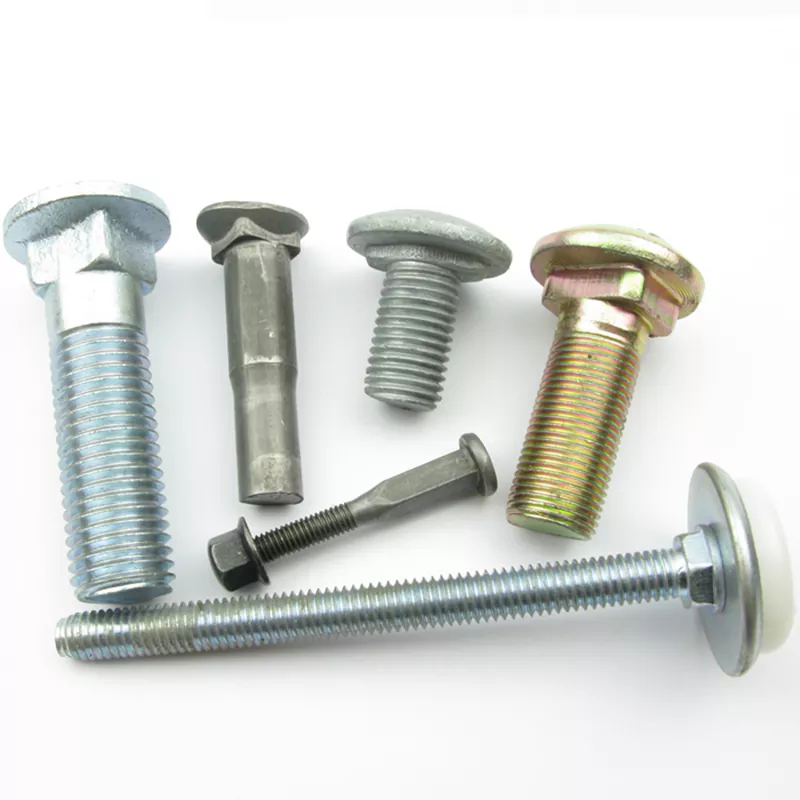Typical Applications of DIN603 Carriage Bolts
2024-06-12
DIN 603 carriage bolts, also known as coach bolts or round head square neck bolts, are specialized fasteners commonly used in woodworking, construction, and other applications where a smooth, finished appearance is desired on one side of the joint. Here's an overview of their features, specifications, and typical applications:
Features:
1. Round Head:
- Carriage bolts feature a round, domed head with a flat bearing surface and a square neck underneath. The round head provides a finished appearance and prevents the bolt from being pulled through the mating material when tightened.
2. Square Neck:
- The square neck, located directly beneath the head, is designed to grip into the wood or metal material, preventing the bolt from spinning during installation.
3. Threaded Shank:
- Carriage bolts have a partially threaded shank, allowing for a secure connection while leaving a smooth, unthreaded section beneath the head. This smooth section prevents damage to the mating material and provides a clean, finished look.
4. Corrosion Resistance:
- Carriage bolts are typically made from steel, stainless steel, or other materials with corrosion-resistant coatings, ensuring long-term durability and reliability, even in outdoor or corrosive environments.
5. Various Sizes and Diameters:
- Carriage bolts are available in a range of sizes, diameters, and lengths to accommodate different applications and thicknesses of materials.
Specifications (DIN 603):
1. Standard:
- DIN 603 is the standard specification for carriage bolts established by the Deutsches Institut für Normung (DIN), the German Institute for Standardization.
2. Material:
- Carriage bolts specified by DIN 603 are typically made from steel or stainless steel, with various grades available to suit different strength and corrosion resistance requirements.
3. Dimensions:
- DIN 603 specifies the dimensions of the carriage bolt's head diameter, head height, square neck dimensions, thread diameter, thread length, and overall length, ensuring consistency and compatibility with mating components.
4. Thread Pitch:
- The thread pitch of DIN 603 carriage bolts is standardized based on the diameter and length of the bolt, ensuring proper thread engagement and secure fastening.
Typical Applications:
1. Woodworking:
- Carriage bolts are commonly used in woodworking projects, such as furniture assembly, framing, and structural applications, where a strong, secure connection is required with a clean, finished appearance on one side.
2. Construction:
- Carriage bolts are widely used in construction and building projects for attaching beams, posts, joists, and other structural elements, particularly in applications where the bolt head must be flush or countersunk into the surface.
3. Outdoor Structures:
- Carriage bolts are suitable for outdoor structures such as fences, decks, pergolas, and playsets, where they provide a secure and durable fastening solution resistant to weather and environmental exposure.
4. Automotive and Machinery:
- Carriage bolts are used in automotive and machinery applications for securing components, panels, brackets, and other parts where a clean, finished appearance and secure fastening are desired.
5. Marine and Industrial:
- In marine and industrial settings, carriage bolts are employed for fastening equipment, machinery, and structures subjected to moisture, corrosion, and vibration, thanks to their corrosion-resistant properties and secure fastening capabilities.
Installation Tips:
1. Pre-Drilling:
- When using carriage bolts in hardwood or dense materials, it's advisable to pre-drill holes slightly smaller than the bolt diameter to prevent splitting and ensure proper alignment.
2. Square Hole:
- Ensure that the square neck of the carriage bolt fits snugly into a square hole or slot in the mating material to prevent the bolt from spinning during tightening.
3. Washer and Nut:
- Use a washer and nut on the threaded end of the carriage bolt to provide additional clamping force and ensure a secure connection.
4. Tightening:
- Tighten the nut with a wrench until snug, taking care not to over-torque, which could damage the mating material or strip the threads.
Conclusion:
DIN 603 carriage bolts are versatile and reliable fasteners commonly used in woodworking, construction, automotive, marine, and industrial applications. With their round head, square neck, partially threaded shank, and corrosion-resistant properties, they provide a secure and aesthetically pleasing fastening solution for a wide range of projects requiring a clean, finished appearance and strong mechanical connection. Proper installation and selection of carriage bolts according to DIN 603 specifications ensure optimal performance, durability, and reliability in various applications.



